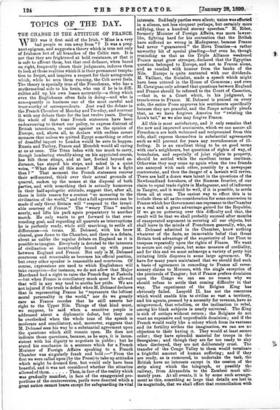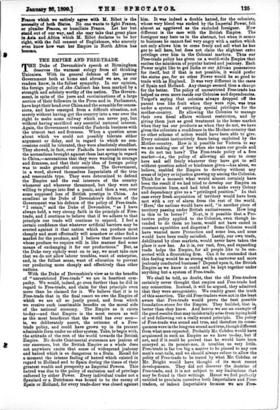TOPICS OF THE DAY.
TEE CHANGE IN THE ATTITUDE OF FRANCE.
WHO was it first said of the Irish, "Mine is EL very bad people to run away from "? It was a preg- nant epigram, and suggests a theory which is true not only of Irishmen but of all branches of the Celtic race. It is not that they are frightened at bold resistance, or that it is safe to affront them, but that cool defiance, when based on right, frequently clears their judgments, induces them to look at those realities which it is their permanent tempta- tion to forget, and inspires a respect for their antagonists which, while he sees them running, the Celt never feels. The theory is specially true of the Frenchman, who has a mathematical side to his brain, who can if he is in diffi- culties add up his own losses accurately—a thing which even the Englishman often fails in doing—and who is consequently in business one of the most careful and trustworthy of correspondents. Just read the debate in the French Chamber of Monday and Tuesday, and contrast it with any debate there for the last twelve years. During the whole of that time French statesmen have been endeavouring to thwart our policy, to express distrust of British intentions, to excite against us the opinion of Europe, and, above all, to declare with endless covert menaces that unless we quitted Egypt something or other of dreadful import to London would be sure to happen. Russia and Turkey, France and Menelek would all spring at us at once. The Titan laden with too much to carry, though lumbering steadily along on his appointed course, has felt these stings, and at last, fretted beyond en- durance, has stayed his steps, and asked in a quiet voice, "What does all this mean ? Must it be a fight then P" That moment the French statesmen recover their self-control, think over their actual grounds of quarrel, reckon up the means at the disposal of both parties, and with something that is actually humorous in their half-apologetic attitude, suggest that, after all, there is little reason for a contest "so menacing to the civilisation of the world," and that a full agreement can be made if only Great Britain will "respond to the invari- able courtesy of France." The "weary Titan" smiles sourly, and lifts his pack again preparatory to another march. He only wants to get forward to that ever- receding goal, and regarding all quarrels as interruptions he is perfectly ready, while still marching, to settle all differences—on terms. M. Delcass6, with his brow cleared, goes down to the Chamber, and there is a debate, about as unlike the regular debate on England as it is possible to imagine. Everybody is devoted to the interests of civilisation so inextricably bound up with peace between England and France. Not only is M. Delcass4 courteous and reasonable as becomes his official position, but every other speaker is reasonable and courteous. Of course, expressions are used to which Englishmen will take exception—for instance, we do not allow that Major Marchand had a right to raise the French flag at Fashoda —but when France is conciliatory much must be allowed that will in any way tend to soothe her pride. We are not injured if the truth is defied when M. Delcass6 declares that in representing France he "represents the loftiest moral personality in the world," nor do we greatly care as France recedes that he still asserts her right to the Upper Nile. Things of that kind must, we suppose, be said when a sensitive people is addressed about a diplomatic defeat, but they can be overlooked when the whole tone of the speech is moderate and conciliatory, and, moreover, suggests that M. Delcass6 sees his way to a substantial agreement upon the questions which still remain open. He does not indicate those questions, because, as he says, it is incon- sistent with his dignity to negotiate in public ; but he stated his conclusion in a sentence which for a French Minister of Foreign Affairs speaking to a French Chamber was singularly frank and bold :—" From the first we were called upon (by the Press) to take up attitudes which might be deemed firm, but would only have been boastful, and it was not considered whether the situation allowed of them Tben, in face of the reality which was gradually manifest, in face of the exaggerated pro- portions of the controversies, perils were descried which a great nation cannot brave except for safeguarding its vital interests. Suddenly parties were silent; union was effected in a silence, not less eloquent perhaps, but certainly more edifying, than a hundred stormy speeches." M. Ribot, formerly Minister of Foreign Affairs, was more lawyer. like, fighting bard for his contention that the British have suffered no wrong in Madagascar, because France had never " guaranteed " the llova Treaties—a rather unworthy bit of special pleading—but even he, though reminding us that as the Triple Alliance weakened France must grow stronger, declared that the Egyptian question belonged to Europe, and not to France alone, and so receded with honour from the banks of the Nile. Europe is quite contented with our dividends. M. Vaillant, the Socialist, made a speech which might have been uttered in the House of Commons ; and even M. Cavaignac only advised that questions between England and France should be referred to the Court of Caseation, —that is, to a Court which, in his judgment, is treacherous to France. M. Delcassd is praised on every side, the entire Press approves his sentiments specifically because they are peaceful, and the Temps actually pleads that, as we have forgiven America for "twisting the Lion's tail," so we also may forgive France.
All this is most satisfactory, and it only remains that the new and improved sentiments, which we can assure all Frenchmen are both welcomed and reciprocated from this side, shall express themselves in substantial agreements such as will prevent for years any recrudescence of ill- feeling. It is an excellent thing to be on good terms with one's neighbours, but questions of rights of way, of boundaries, and especially of joint rights to property, should be settled while the excellent terms continue. Otherwise they may come up again when the two friends are annoyed with each other, possibly by a newspaper controversy, and then the danger of a lawsuit will revive. There are half a dozen wars latent in the questions of the Newfoundland foreshore, of the Siamese frontier, of our claim to equal trade rights in Madagascar, and of influence in Tangier, and it would be well, if it is possible, to settle them all at once. The easiest way to effect this is to include them all as the consideration for some concession to France which her Government can represent to the Chamber as a real and a great advantage gained for the Republic. If we go on pottering over this difficulty and that, the result will be that we shall probably succeed after months of exasperated argument in securing all our objects, but shall leave in the minds of Frenchmen generally, who, as M. Delcass4 admitted in the Chamber, know nothing whatever of the facts, an immovable belief that Great Britain took advantage of the superiority of her Fleet to trespass repeatedly upon the rights of France. We want to secure not only peace, but some measure of cordiality, and for this end we must submerge a, variety of petty but irritating little disputes in some large agreement. We have for many years maintained that we should find such a basis of agreement in conceding to • France all rever- sionary claims to Morocco, with the single exception of the peninsula of Tangier ; but if France prefers dominion upon the Congo we can see no reason why we should refuse to settle that coming difficulty in that way. The experiment of the Belgian King has obviously failed. Leopold IL has not the resources which would enable him to civilise so vast a territory, and his agents, pressed by a necessity for revenue, have so misgoverned, that rebellion, or the inclination to rebel, among his black subjects is nearly universal. The King is sick of outlays without return ; the Belgians do not want an expensive and unprofitable dominion; and if the French would really like a colony which from its vastness and its fertility strikes the imagination, we can see no objection to their having it. They would at least secure order ; they have splendid material for troops in the Senegalese ; and though they are far too ready to slay when disobeyed, they are not deliberately cruel. The transfer of • the Congo Valley to them would terminate a frightful amount of human suffering; and if they are ready, as is rumoured, to undertake the task, the British have no interests except in the cession of the strip along which the telegraph, or possibly the railway, from Alexandria to the Zambesi must ulti- mately pass. At all events, it is by some such arrange- ment as this, something so large that details are lost in its magnitude, that we shall effect that reconciliation with France whieh we entirely agree with M. Ribot is the necessity of both States. No one wants to fig.ht France, or plunder Prance, or humiliate France. Let her but stand out of our way, and she may take that great place in Asia and Africa which M. Ribot declares to be her right, with the full consent of Englishmen, who scarcely even know how vast her Empire in North Africa has become.



















































 Previous page
Previous page